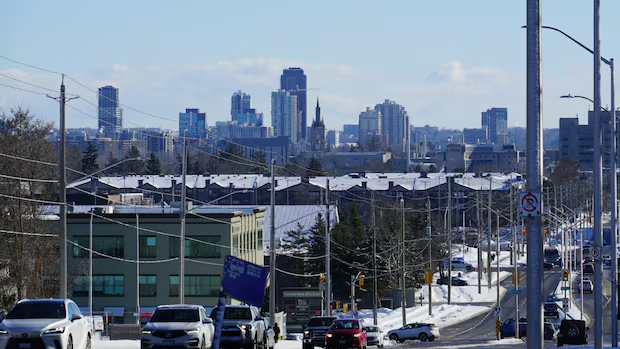Legal clinics worry changes to provincial rental rules will increase homelessness

Listen to this article
Estimated 5 minutes
The audio version of this article is generated by text-to-speech, a technology based on artificial intelligence.
Two southwestern Ontario legal clinics are among 132 community groups who have signed an open letter calling on the Ford Government to scrap proposed changes to the province’s residential tenancy laws.
The changes contained in the omnibus Bill 60 would weaken renters’ rights, expedite tenant evictions, and exacerbate the homelessness crisis, reads the letter, published last week and signed by housing and tenant advocates, food banks, legal clinics, and other groups.
The province has said Bill 60, or the Fighting Delays, Building Faster Act, is meant to address the backlog of disputes at the Landlord and Tenant Board (LTB), and increase rental supply.
However, the proposed amendments to the Residential Tenancies Act won’t solve those delays, but will “exponentially increase” the number of people living on the street, argues Jamie Hildebrand of Huron Perth Community Legal Clinic, which signed the letter.
If approved, Bill 60 would reduce the time tenants have to appeal LTB decisions, limit their ability to raise new issues at the LTB, and shorten the grace period for non-payment of rent from 14 days to seven.
“As if that has anything to do with the delays at the board,” said Hildebrand, the clinic’s executive director.
“If it is easier to get the money together and stop the process in 14 days, there are going to be … predictably, a number of people who can’t do it in seven days, which means more cases are going to go to the LTB.”
Under the proposed legislation, landlords also won’t have to wait as long for eviction hearings, and landlords moving back into an occupied rental unit won’t have to compensate the impacted tenant as long as they give 120 days notice.
It would also require tenants to pay 50 per cent of alleged arrears before they can raise maintenance or harassment issues at an LTB hearing.
LISTEN | Ontario groups call on province to scrap changes to residential tenancies law:
Afternoon Drive7:57Housing advocates call on province to repeal parts of Bill 60
More than 100 groups across the province have signed an open letter urging the province to reconsider parts of Bill 60, which they say will increase homelessness. Jamie Hildebrand, a lawyer and executive director of the Huron Perth Community Legal Clinic, shares more.
A spokesperson for Housing Minister Rob Flack reiterated that the bill will restore balance and confidence in Ontario’s rental market by improving accountability for those who repeatedly abuse the system, and create backlogs at LTB.
“It also ensures families who depend on rental income are able to pay their mortgages, property taxes, and utility bills that keeps more rental homes available — protecting the long-term stability of Ontario’s rental housing supply,” said Daniel Strauss.
The province says the aim is to “cut red tape, get shovels in the ground faster, and support the construction of homes, roads and infrastructure.”
The bill has received pushback from Hamilton and Toronto, whose city councils recently voted to oppose it over concerns about tenant rights and increased homelessness.
Last month, public opposition led the province to reverse course on a proposal that could have opened the door to ending rent control and indefinite leases.
The Ontario New Democrats and other critics have argued the province is pushing the omnibus bill through Queen’s Park without adequate public consultation or debate.
The bill itself flown through the Ontario legislature. After being tabled on Oct. 23, the bill was ordered for a third and final reading on Monday, meaning a vote could be called this week. Debate during third reading has been capped at two hours.
“They really, really, really want to push this through,” said Jeff Wilkins, a housing paralegal with Chatham-Kent Legal Clinic, another signatory.
“This isn’t the first time we’ve seen this government attack tenants. They did it with rent deregulation too. This one is just a little more scary, because it seems like they are swinging at the fences.”
In London, city statistics show roughly 2,000 people were active on the municipal by-name list in October, meaning they were experiencing homelessness on the last day of the month. Just over 1,000 were listed as chronically homeless — homeless for six months or more in the last year.
Like Hildebrand, Wilkins believes the changes will make it harder for tenants to hold onto housing and increase homelessness. “We’re already seeing a lot of evictions as it is now,” he said.
He also worries about a change that could lead to the LTB being unable to consider tenant circumstances in an eviction ruling, as established in Section 83 of the Residential Tenancies Act.
The Bill 60 amends Section 83 to read that the power of the LTB be subject to “any prescribed limitations and conditions,” including those the government could impose in the future.
“It’s just so strange that they’re making all of these changes, and they’re trying to blame professional tenants,” Wilkins said.
“I used to work for landlords, very big landlords, and anybody in the industry will tell you professional tenants are very few and far between.”
Hildebrand says he would like to see in-person LTB hearings, saying it would help reduce a barrier for lower-income Ontarians, and clear the backlog, noting responses to applications that used to take weeks now take months.
“In-person hearings work. They’re efficient, and people with zero access to technology can participate.”





